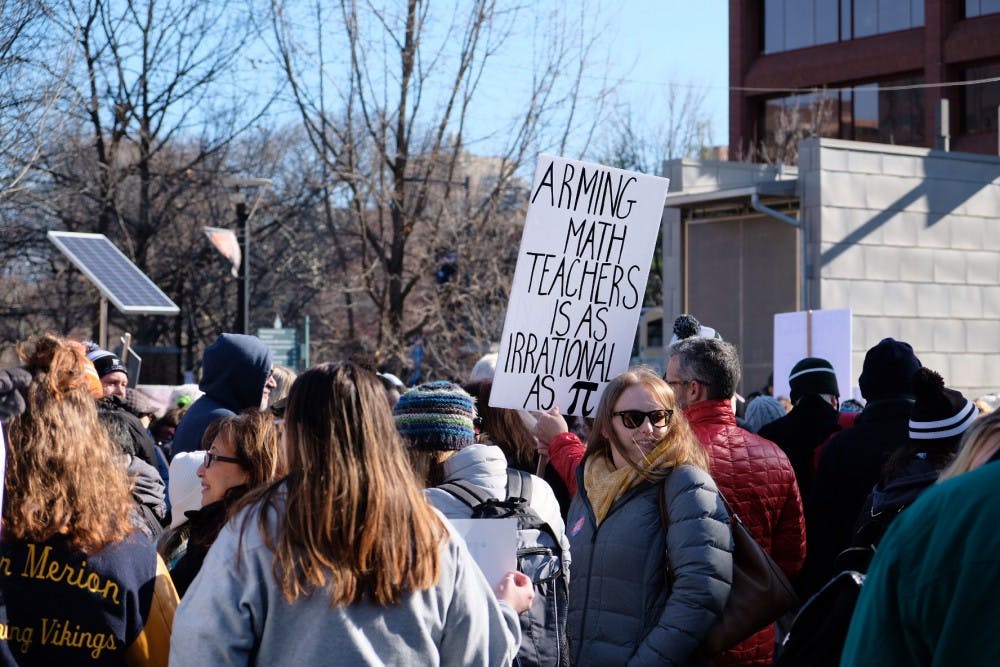Amid discussions about gun violence at schools, proposals to arm American teachers have surfaced in public discourse. At Penn and across the country, educators are pushing back against proposals to arm teachers with weapons.
As CNN reported, Olivia Bertels, a middle school English teacher in Kansas, and Brittany Wheaton, an English teacher in Utah, first began the #ArmMeWith movement after President Trump suggested to train and arm teachers to deter mass shootings during a listening session with survivors of the Feb. 14 Parkland, Fla. mass shooting.
Teachers are responding to Trump’s suggestion with what they feel would actually benefit schools and students, like more guidance counselors, newer textbooks, and smaller class sizes.
The Penn's Urban Studies Program Director Elaine Simon said social media movements like #ArmMeWith can be effective in raising attention to important issues by providing a shorthand way of making a statement and reaching a national audience.
Simon also said that Trump's call for arming teachers is completely misguided. “It reflects someone that has no idea what it means to be in a classroom,” she said.
As Simon further noted, teachers already have so much to deal with on a daily basis that adding responsibility over a firearm would be far too much to ask. She added that a vast majority of educators are not qualified to operate a firearm, let alone use one precisely in the event of an emergency.
Joel Fein, professor of pediatrics at the Perelman School of Medicine and co-director of the Violence Prevention Initiative of the Children’s Hospital of Philadelphia, agreed with this sentiment, “I think its either ill-informed to say that arming teachers would be able to prevent mass shootings on campuses, or it is based on absolutely no data that I know of.”
RELATED:
Penn students prepare to join thousands across the country for 'March For Our Lives'
'Choose me over a gun’: Penn students, profs march with Philadelphia to end gun violence
Following mass shootings, student groups host nonpartisan 'walk-in' to discuss gun violence
Fein further posited that an increase in funding for counseling in schools and more research into student health care and well-being could act as a real deterrent to mass shootings on campuses.
Trump has since clarified his suggestion, saying he had never called to arm all teachers. "What I said was to look at the possibility of giving concealed guns to gun adept teachers with military or special training experience — only the best," Trump said on Twitter.

Since the shooting at Marjory Stoneman Douglas High School, there have been reports of at least three different instances of guns accidentally firing in schools, and another school shooting at Great Mills High School in Maryland, which left a sixteen-year-old student in critical condition.
Steven Berkowitz, professor of Clinical Psychiatry and director of the Center for Youth and Family Traumatic Stress Recovery at Penn, said that the entire approach to preventing mass shootings on campuses needs to be completely rethought.
As he explained, today’s competitive education system places tremendous pressure on students to achieve academically, with all other alternatives being regarded as failure. This can lead to troubled, isolated students.
“Part of the history of these school shootings is these very disaffected kids, many of whom clearly have emotional issues but do not feel as if they are a part of anything. They feel really removed and isolated, and we do not do anything about that in a school setting in any structural way,” Berkowitz said. “I think a lot of the funding to do that and to rethink how and what we are teaching is really useful.”

Penn students also have thoughts on the movement.
College junior Elise Reynolds, who helped organize the student demonstration Penn Students Stand Against Gun Violence, said she thinks the #ArmMeWith movement is a wonderful idea. “My mom is a high school teacher, and I think that it is really great to see teachers engaging in activism in this way, and I love the idea of 'arm me with the resources that I need to do my job,'” she said.
College senior Jana Korn, who also helped plan PSSAGV, said, “I could definitely see this being an issue that riles up enough teachers,” but added that “there is only so much that a hashtag can do.”
Korn was also one of the three organizers of Philadelphia's "March For Our Lives" protest on Saturday. She worked with two high school students to plan the event, and thousands of people — Philadelphia residents and Penn students and professors alike — marched in solidarity.



